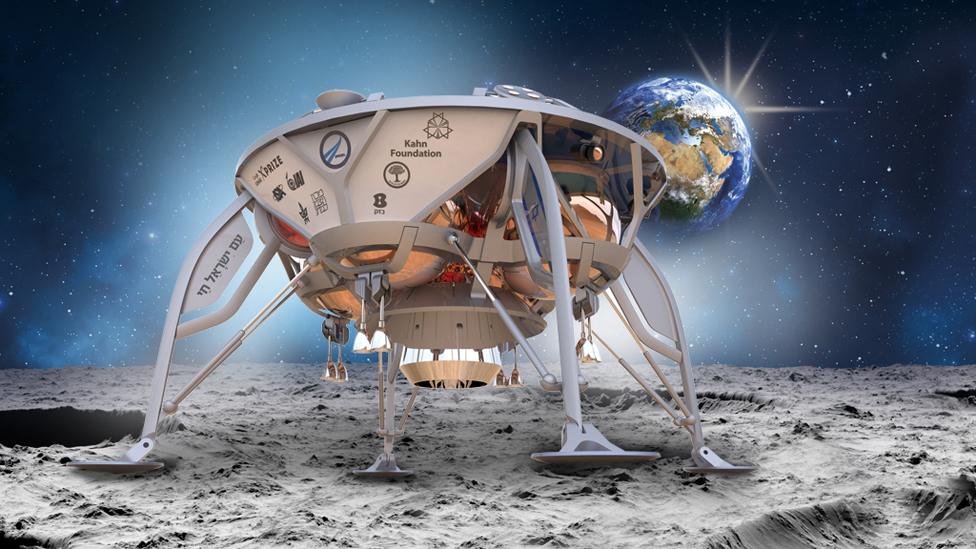Israeli Google Lunar X Prize team books rocket
- Published

SpaceIL's lander would hop across the lunar surface to cover at least 500m
Israeli team SpaceIL has booked a rocket ride to send a probe to the Moon as part of the .
It is the first group in the competition to formally lodge a verified launch contract with the competition's organisers.
That is significant because it will trigger an extension in the prize's deadline to the end of 2017.
To win, a team must land on the Moon, roam at least 500m, and return hi-res video and images to Earth.
in the second half of 2017, using a SpaceX Falcon 9 rocket to send it on its way.
The Israeli team's spacecraft will be a primary payload on a multi-mission launch.
The rocket contract was announced at a news conference in Jerusalem.
If SpaceIL can achieve its goal of winning the X Prize, it will become not only the first Israeli mission to the Moon, but also the world's first privately funded lunar mission.
"Only three countries have 'soft-landed' a rover on the surface of the Moon: the United States, the former Soviet Union and China. Now, the notion of the small state of Israel being added to this exclusive list look more promising than ever," SpaceIL CEO Eran Privman said in a statement.
"Last year, we made significant strides toward landing on the Moon, both in terms of project financing and in terms of the engineering design and now, we are thrilled to finally secure our launch agreement.
"This takes us one huge step closer to realise our vision of recreating an 'Apollo effect' in Israel: to inspire a new generation to pursue science, engineering, technology, and math(s)."
The Falcon ride is actually booked with an intermediary, Spaceflight Industries, which has a contract with SpaceX
Other teams in the competition are sure to follow suit and lodge launch contracts in the coming weeks and months.
US team Moon Express said last week that it would be going on a New Zealand rocket, although the X Prize Foundation told the 91Čȱ¬ that it had yet to see any paperwork and so could not verify a launch contract.
The Lunar X Prize was set up in 2007 with $30m in support from the internet giant Google.
The deadline for claiming its $20m first prize was originally set for 31 December 2012, but this was subsequently extended to give teams more time to grapple with the major technical and financial obstacles of building a Moon mission. Organisers even handed out some "milestone prizes" in 2014 to further encourage the challengers.
Earlier this year, the foundation announced that it would again extend the competition's deadline, this time to the end of 2017, but only if at least one team came forward with a verified launch contract before 31 December 2015. SpaceIL's announcement meets this provision, and so triggers the extension.
The remaining 15 teams in the competition now have until the end of 2016 to demonstrate their own launch contracts, to complete a mission and claim the prize by 31 December 2017.
The administers a number of competitions aimed at incentivising technological breakthrough in a range of fields, including climate, healthcare, education and exploration.
In 2005, a privately funded rocket plane, by completing two flights above the Earth's atmosphere inside a week.
The vehicle's technology now forms the basis of a spaceliner being developed by entrepreneur Sir Richard Branson and his Virgin Group.
SpaceIL has released details of its latest design concept
Jonathan.Amos-INTERNET@bbc.co.uk, external and follow me on Twitter: